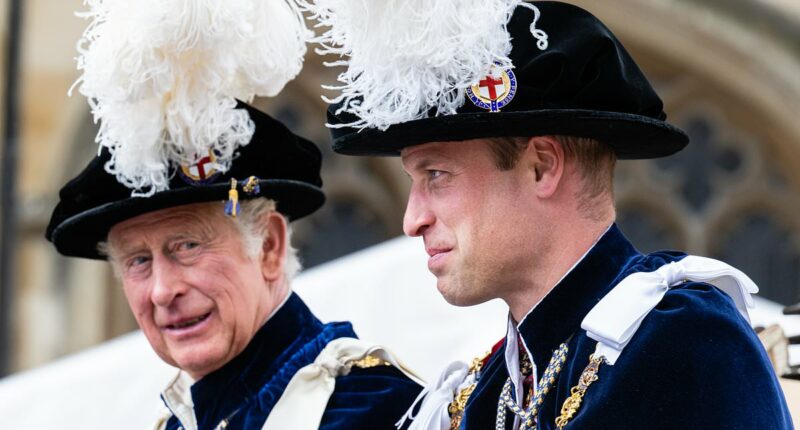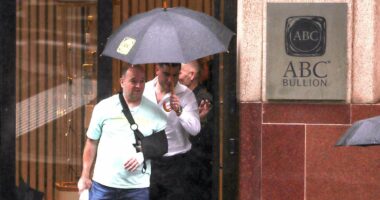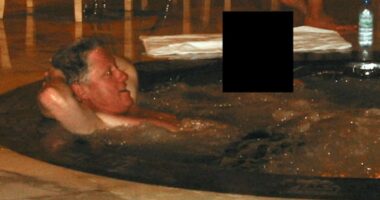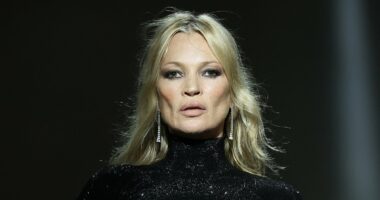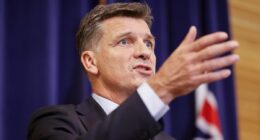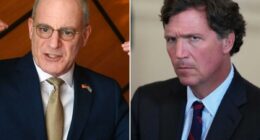Share this @internewscast.com
Wealth is a concept that varies in significance, even for those with substantial assets, including multiple personal attendants and a remarkable array of properties.
Charles, during his tenure as Prince of Wales, didn’t exactly bask in his considerable fortune.
When criticized for the millions he earned annually from the Duchy of Cornwall, he privately expressed disappointment that its value was merely around £1 billion. He noted that its London properties were in Kennington, which lacks the prestigious allure of areas like Belgravia.
In stark contrast, when the Duke of Westminster, an old acquaintance, passed away in 2016, his Grosvenor Estate—valued at approximately £9 billion and comprising some of London’s most exclusive locales—was inherited by his son Hugh, instantly making him one of the wealthiest individuals in the UK at just 25.
What can we infer about King Charles from this? Coupled with his penchant for a lavish lifestyle, which often irked his father Philip, one might assume he would be extravagant with public funds.
However, King Charles is proving otherwise, as he diligently works to reduce the burden on taxpayers—and is notably successful in doing so.
The King, who turns 77 next week, knows he has no time to waste in the top job. Asked recently about his love of painting watercolours, he sighed and said: ‘I don’t have time any more.’
As his paintbrushes gather dust, he’s been trying to make changes that he hopes will keep the monarchy fit for generations to come. And that has meant cutting costs as well as the dead wood that’s been allowed to accumulate during his mother’s long reign. Surprised at the way Buckingham Palace was being run, the King moved quickly after his accession to slash through the clutter of an overstaffed Royal Household.

Hugh Grosvenor inherited the Grosvenor Estate in 2016 – then valued at around £9billion and consisting of some of London’s most exclusive areas

Like his father, William has been trying to reorganise the finances of his own estate, the Duchy of Cornwall
He bluntly instructed long-serving senior courtiers Vice-Admiral Sir Tony Johnstone-Burt, Master of the Household, and Sir Michael Stevens, Keeper of the Purse and Treasurer to the King, that he wanted change – and fast.
His plans were met with push-back from high-ranking courtiers. Some of the senior figures in the top-heavy Palace Household, accustomed to the more sedate pace of the late Queen’s twilight years, did not grasp at first that when the King flagged an issue, he expected immediate action.
‘Sure, he lost his temper when nothing changed, when he returned and saw nothing had been done, but eventually they got the message,’ said a senior source. ‘There have been staff cutbacks. That started straight away. The buzz phrase in the Household now is “value for money”.’
Aides have been ordered to tighten spending from the taxpayer-funded Sovereign Grant and the Duchy of Lancaster – the sovereign’s chief source of private funds.
Charles also told them that the Royal Household was ‘top-heavy’ – too many high-paid chiefs and not enough lower-ranked staff remunerated fairly.
‘Too many advisers to advisers,’ one insider remarked. ‘That stops now. The Boss demands efficiency, real work, fair pay.’
Another said: ‘The old ways made no sense. Change had to come.’
The King’s priority is smarter use of resources – such as offering competitive pay and pensions to hire and keep top-tier staff.

Beatrice and Eugenie have been told unequivocally they’ll have to stand on their own two feet and pay their own way as part of Charles’s cost cutting

Lancaster Castle forms part of the Duchy of Lancaster – a major source of income for the monarchy
Several non-working members of the Royal Family, including Charles’s nieces Princesses Beatrice and Eugenie, have been told unequivocally they’ll have to stand on their own two feet and pay their own way.
One of the issues that frustrated the King, as he confided to friends, was that the Palace was ‘being run like a hotel, and not a very good one.’ Indeed, several members of the extended Royal Family have continued to enjoy subsidised accommodation, with some allowing their apartments to be used by their children as ‘London pads’.
An inside source said: ‘Over time, that is all going to change. Properties will be let at commercial rates going forward and to people outside the family. Where it is in a Palace environment, they will of course be security vetted.’
Another source was more blunt: ‘The King isn’t running a housing association for distant relatives.’
The eviction of Harry and Meghan from Frogmore Cottage, a Crown Estate property granted to them by the late Queen but unused since their move abroad, was only the start of the process.
Their loss of a British base, announced soon after publication of Harry’s memoir Spare, was described by one senior source as the ‘tip of the iceberg’. The message is clear: no freeloaders in the modern monarchy.
Over the past couple of years, the Palace has unmistakably shifted. ‘This isn’t about financial cuts,’ an insider remarked. ‘It’s about getting value for money and efficiency. Sometimes less truly is more.’ Since becoming the Prince of Wales and Duke of Cornwall on his father’s accession, William has been meticulous in watching over how his lucrative Duchy of Cornwall is run. To the surprise of some, he stays until the very end of Duchy finance meetings – and asks questions.
‘He is right across it and won’t be bamboozled or have the wool pulled over his eyes,’ says a source.

While royal weddings, such as Harry and Meghan’s in 2018, undoubtedly draw crowds, this rarely translates into lasting economic benefit
Last year, he earned a total of more than £23million from the estate – a matter of public record.
When his father was Duke of Cornwall, he publicly disclosed from 1993 onwards how much money he paid in tax from his Duchy income. Not William.
The new Prince of Wales guards his privacy jealously, and keeps the amount he pays in tax a closely guarded secret.
What does the monarchy cost us? This year, the Sovereign Grant rose by 53 per cent from the year before to £132.1million (including £34million allocated annually for the decade-long refurbishment of Buckingham Palace). This money will be offset by profits from the Crown Estate – but it’s nevertheless bound to intensify calls for a comprehensive audit of royal finances. To many, that seems overdue, not least because of all the other royal expenses, some of which are hidden from the public.
The anti-monarchy campaign group Republic discovered that scores of military personnel are seconded to the Royal Household, costing taxpayers more than £500,000 in 2023. Most of these fill logistical, advisory or ceremonial support roles. Plus, over the years, many private secretaries have been seconded from the Foreign and Commonwealth Office.
It gets worse. Two of Charles’s three valets, I can reveal, are senior warrant officers who are actually paid for by the Ministry of Defence, while – according to a senior Household source – the Royal Logistics Corps is now used to transport the King’s bags. These were once handled privately, and much more cost-effectively, when he was Prince of Wales by a company called Arterial Moving.
And a Flag Sergeant, whose job is raising the Royal Standard wherever the Monarch is present, is also bizarrely tasked with cleaning the shoes of the Master of the Household. He cleans the shoes of the Master’s deputy, too.
Leaving that aside, once you throw in royal protection, the real cost of the monarchy, according to Republic, may actually top a staggering £510million.
Is it worth it? Supporters claim the monarchy pulls in millions of pounds by boosting tourism and ‘Brand Britain’. The real figures, however, are elusive.
Reports reveal that 60 per cent of visitors come to look at royal sites, with Buckingham Palace high on the list. So it’s clear they pull in crowds – but how do you put a price on that? Frankly, it’s anyone’s guess.
After all, around ten million people flock each year to the Palace of Versailles, ten miles from Paris, thus making it one of the world’s most visited landmarks. But no one lives there any more.
In fact, France hasn’t had a truly royal ruler since Louis-Philippe I, whose reign ended with the 1848 February Revolution and the birth of the Second Republic. All those years without a monarch, yet Versailles remains a magnet for tourists.
By contrast, Buckingham Palace – where the King conducts official business – draws nearly 550,000 visitors annually. That’s roughly a 20th of the number who go to Versailles, though it’s worth noting that the Palace has far more limited public access.
True, major royal events can deliver a short-term jolt to the economy, but the impact is often fleeting and mixed.
The 2012 Diamond Jubilee bank holiday, for instance, cost an estimated £1.2billion in lost productivity, while the 2022 Platinum Jubilee set the economy back £2.4billion.
And while royal weddings, such as Harry and Meghan’s in 2018, undoubtedly draw crowds, this rarely translates into lasting economic benefit.
Despite growing calls for transparency, royal finances remain notoriously opaque, shielded by age-old tradition, privacy laws and special exemptions.
Key expenses, including the Royal Family’s security and their net income from private estates, remain frustratingly murky. A year ago, a collaboration between Channel 4 and the Sunday Times revealed – after a five-month investigation – that the King’s Duchy of Lancaster and William’s Duchy of Cornwall estates bolster their considerable income by raking in £50million from National Health Service hospitals and state schools.
Both trusts rent out land and buildings they own to public bodies. For instance, the Duchy of Lancaster brings in profits from an £11million, 15-year contract that grants an NHS hospital trust use of a London warehouse near Tower Bridge to house ambulances.
In January 2023, the Duchy even tried to reap good publicity from the deal by releasing a statement saying it was ‘pleased to be of assistance’ to Guy’s and St Thomas’ NHS Foundation Trust.
As for the Duchy of Cornwall, it has quietly turned its vast estate into a cash machine. In Dorset, fire and county authorities have been tied into long-term leases, as have state schools, while the Ministry of Justice now pays to occupy Dartmoor Prison.
The Royal Navy, too, pays for jetties and ship moorings on Duchy shores. Even charities – from St John Ambulance to Comic Relief – have rented garages and offices. Negotiated under Charles and overseen by Prince William, these deals have netted the Duchy of Cornwall tens of millions of pounds.
Both ancient trusts, of course, work within the letter of the law.
In response, a spokesman said: ‘The Duchy of Lancaster operates as a commercial company, managing a broad range of land and property assets across England and Wales. It complies with all relevant UK legislation and regulatory standards applicable to its range of business activities.’
But that is missing the point. Can these deals be morally right when they benefit a man who is not only Head of State but also head of the nation?
And whether they pass the sniff test or not, shouldn’t they all at least be a matter of public record? King Charles doesn’t seem to think so.
When his aides pressed last year for more transparency on the running of the Duchy of Lancaster, says a royal source, Charles pushed back.
As you’d expect, revelations about the sums both duchies were raking in from publicly funded bodies have caused a furore. The broadcaster and author Libby Purves, for example, labelled them a ‘PR disaster’ that even ‘the staunchest monarchist will wince at’.
Norman Baker, the former Liberal MP and Privy Councillor, highlighted tax breaks enjoyed by the royals and the ever-expanding Sovereign Grant – all fuelled, he said, by Palace lobbying.
He demanded reforms to the two duchies to challenge what he describes as the UK’s ‘last imperial monarchy’. Many may have felt he had a valid point. After all, it was hardly the first time we’d heard jaw-dropping revelations about royal finances.
The so-called ‘Paradise Papers’, leaked to the Press in 2017, showed that the Duchy of Lancaster, then Queen Elizabeth’s private estate, had around £10million in offshore funds, including some based in Bermuda and the Cayman Islands.
A portion of this invested money was linked to a company accused of exploiting poor families through predatory rent-to-own schemes. It was not a good look.
Once again, no laws had been broken, but questions were raised about how appropriate it was for Britain’s head of state to benefit financially from these secretive arrangements.
Nor were they limited to rents and offshore funds. In 2023, an investigation revealed what happened to unclaimed estates in Cornwall and Lancashire – in other words, the properties of those who die without heirs.
It turned out that both duchies were benefiting. Despite promises made in the aftermath of the Second World War to direct such funds to charity, many of these unclaimed estates were swelling royal property portfolios.
Incredibly, this centuries-old practice continues to this day.
Today, the extent of King Charles’s fortune remains opaque, blending as it does personal and national holdings. All we know is that his wealth spans Balmoral, Sandringham, the Duchy of Lancaster, vast art collections, stud farms and a stock portfolio.
While he’s taxed on his income and gains, he – unlike a growing number of his subjects – has no worries about inheritance tax laying waste to his fortune. The King, you see, is exempt.
In 2025, the monarchy stands at a crossroads. Its survival hinges on balancing tradition with modern expectations. At its best, it unites above politics; at its worst, it feels like a gilded relic – vulnerable to irrelevance and scandal.
Today’s royals face a shifting public mood. Younger Britons are not instinctive monarchists – they lean towards republicanism.
And lack of transparency, when it comes to the monarchy’s finances, is likely to take its toll.
If the Crown ceases to connect, it will not collapse in chaos. It will fade gently – until one day it is no longer missed.
Legacy and spectacle are not enough. The monarchy’s future hangs on something more fragile: the people’s trust.
■ Adapted from The Windsor Legacy by Robert Jobson (John Blake, £22), to be published November 6. © Robert Jobson 2025. Pre-order a copy of The Windsor Legacy (9781789468762) for only £10 (RRP £22) from tgjonesonline.co.uk. Use code DM-WINDSOR10 at checkout. Offer valid until November 12, 2025. Excludes delivery. Online only. Terms apply.
